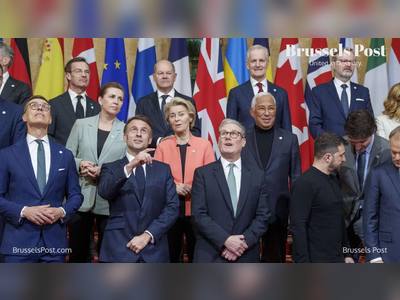Half of Poles Believe in Lab-Made Viruses for Population Control, New Eurobarometer Survey Reveals
The survey indicates a significant belief in conspiracy theories despite a general trust in science across the EU.
A recent Eurobarometer survey has revealed that half of the respondents in Poland believe that viruses are artificially created in laboratories as a means of controlling populations.
This percentage notably exceeds the EU average of 35%.
The survey, conducted in September and October 2024, gathered responses from over 34,000 individuals across 27 EU member states, as well as participants from Turkey, North Macedonia, Serbia, and the United Kingdom.
The findings indicate a troubling shift in public perception regarding viruses, with the proportion of Poles believing they are man-made increasing by 10 percentage points since 2021. This rise has been characterized by a decrease in the number of respondents selecting 'don't know' as an answer.
The survey also highlighted a parallel increase in skepticism toward vaccines in Poland, where 21% of respondents now express negative sentiments towards vaccination—an increase of five points from previous years.
Conversely, the survey indicates that 83% of EU citizens view science and technology in a positive light, with 67% agreeing that these advancements enhance and simplify everyday life.
Confidence remains strong regarding renewable energy (87%), information and communication technologies (79%), and vaccines in combatting infectious diseases (77%)—all seen as beneficial developments over the next two decades.
Participants were prompted to evaluate various statements related to medical conspiracy theories.
In addition to the 50% of Polish respondents who believe that viruses are used to control freedom, it was noted that 62% of individuals in Portugal share this perspective, marking the highest percentage in the EU. The survey also identified a concerning trend: nearly one-third of Poles think that humans once coexisted with dinosaurs, highlighting ongoing misperceptions about scientific facts.
The belief that climate change is predominantly a natural phenomenon, rather than a result of human activity, is also prevalent in Poland, where 52% of respondents align with this view.
Experts have pointed out that the rise of conspiracy beliefs and skepticism is exacerbated by widespread disinformation and a climate of social uncertainty.
Analysts emphasize that disinformation tends to thrive in environments filled with fear and uncertainty, as conspiracy theories offer simplified answers to complex problems and often cast elite groups as responsible for societal issues.
Despite the challenges presented by misinformation, the survey showcases a notable interest in scientific education, with 58% of respondents from participating countries expressing a desire for more knowledge about scientific discoveries through avenues such as libraries and museums.
In Poland, 51% of respondents indicated a similar desire for learning more about science.
As concerns over disinformation grow, experts call for communication strategies that address societal fears and enhance media literacy, encouraging a more mindful engagement with information sources.
The findings of the Eurobarometer survey underscore the importance of fostering scientific awareness while countering the effects of misinformation.
This percentage notably exceeds the EU average of 35%.
The survey, conducted in September and October 2024, gathered responses from over 34,000 individuals across 27 EU member states, as well as participants from Turkey, North Macedonia, Serbia, and the United Kingdom.
The findings indicate a troubling shift in public perception regarding viruses, with the proportion of Poles believing they are man-made increasing by 10 percentage points since 2021. This rise has been characterized by a decrease in the number of respondents selecting 'don't know' as an answer.
The survey also highlighted a parallel increase in skepticism toward vaccines in Poland, where 21% of respondents now express negative sentiments towards vaccination—an increase of five points from previous years.
Conversely, the survey indicates that 83% of EU citizens view science and technology in a positive light, with 67% agreeing that these advancements enhance and simplify everyday life.
Confidence remains strong regarding renewable energy (87%), information and communication technologies (79%), and vaccines in combatting infectious diseases (77%)—all seen as beneficial developments over the next two decades.
Participants were prompted to evaluate various statements related to medical conspiracy theories.
In addition to the 50% of Polish respondents who believe that viruses are used to control freedom, it was noted that 62% of individuals in Portugal share this perspective, marking the highest percentage in the EU. The survey also identified a concerning trend: nearly one-third of Poles think that humans once coexisted with dinosaurs, highlighting ongoing misperceptions about scientific facts.
The belief that climate change is predominantly a natural phenomenon, rather than a result of human activity, is also prevalent in Poland, where 52% of respondents align with this view.
Experts have pointed out that the rise of conspiracy beliefs and skepticism is exacerbated by widespread disinformation and a climate of social uncertainty.
Analysts emphasize that disinformation tends to thrive in environments filled with fear and uncertainty, as conspiracy theories offer simplified answers to complex problems and often cast elite groups as responsible for societal issues.
Despite the challenges presented by misinformation, the survey showcases a notable interest in scientific education, with 58% of respondents from participating countries expressing a desire for more knowledge about scientific discoveries through avenues such as libraries and museums.
In Poland, 51% of respondents indicated a similar desire for learning more about science.
As concerns over disinformation grow, experts call for communication strategies that address societal fears and enhance media literacy, encouraging a more mindful engagement with information sources.
The findings of the Eurobarometer survey underscore the importance of fostering scientific awareness while countering the effects of misinformation.
AI Disclaimer: An advanced artificial intelligence (AI) system generated the content of this page on its own. This innovative technology conducts extensive research from a variety of reliable sources, performs rigorous fact-checking and verification, cleans up and balances biased or manipulated content, and presents a minimal factual summary that is just enough yet essential for you to function as an informed and educated citizen. Please keep in mind, however, that this system is an evolving technology, and as a result, the article may contain accidental inaccuracies or errors. We urge you to help us improve our site by reporting any inaccuracies you find using the "Contact Us" link at the bottom of this page. Your helpful feedback helps us improve our system and deliver more precise content. When you find an article of interest here, please look for the full and extensive coverage of this topic in traditional news sources, as they are written by professional journalists that we try to support, not replace. We appreciate your understanding and assistance.










